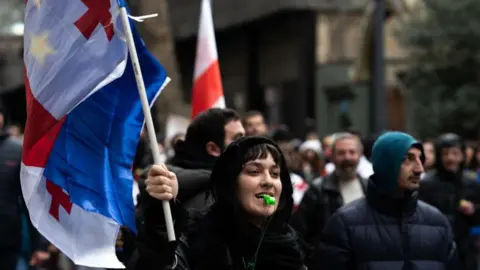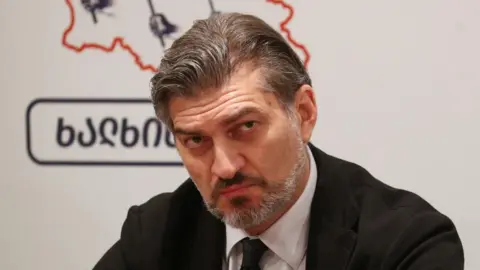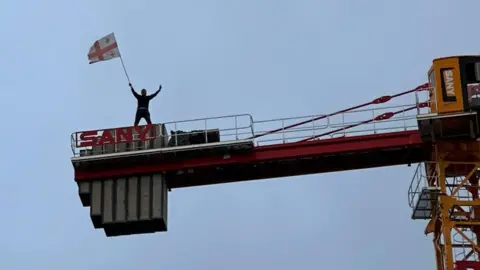
A former Manchester City footballer has been named president of Georgia’s disputed parliament, after 17 days of pro-EU protests that have swept the country’s towns and cities.
Mikheil Kavelashvili, now 53, is a former MP for the increasingly authoritarian ruling Georgian Dream party and was the only candidate for the position.
On Saturday, 224 of the 225 members of Georgia’s electoral college voted for him.
The four main opposition groups rejected Kavelashvili and boycotted parliament, insisting that elections held in October were rigged.
Large crowds of protesters, braving freezing temperatures, gathered outside parliament from the early hours of Saturday morning ahead of the vote.
Georgia’s outgoing pro-Western president, Salome Zourabichvili, condemned Kavelashvili’s election as a sham, insisting that she holds the only legitimate institution left in Georgia.
Prime Minister Irakli Kobakhidze accused Zourabichvili of trying to harm Georgia’s interests, stressing that when his term ends on December 29, he will have to step down.
“We have very strong state institutions, so we certainly do not have any difficulty in fully controlling the situation,” he said on Friday.
Nino Tsilosani, a party colleague, told reporters that Zourabichvili was no longer president in the eyes of the public.
 Reuters
ReutersProtests against the Georgian Dream began immediately after the October elections, but came to life on November 28, when the government announced that it would suspend EU accession negotiations until 2028.
An overwhelming majority of Georgians support the country’s path to the European Union and it is part of the constitution.
Every night, the main avenue in front of parliament is filled with protesters draped in EU flags, demanding new elections.
The night before the vote, the capital Tbilisi was convulsed by emerging protests involving IT specialists, public sector workers, creative industry professionals, actors and lawyers.
“We are here to create a rule of law once and for all, to respect the provisions of the Constitution and human rights,” said lawyer Davit Kikaleishvili, 47.
Kavelashvili is one of the founders of the People Power party, known for being the main voice of anti-Western propaganda in Georgia.
He has accused opposition parties of acting as a “fifth column” directed from abroad and has described President Zourabichvili as a “principal agent.”
Kavelashvili entered politics after he was disqualified from running for the leadership of the Georgian football federation because he lacked the qualifications.
Although his party ran alongside Georgian Dream in the October elections, it has now decided to act in parliament as a “healthy opposition”, to take the place of the “so-called radical opposition financed by foreign forces”.
A People’s Power Party MP, Guram Macharashvili, who announced on December 13 that his faction would abandon the ruling parliamentary majority, told the BBC that what was happening in the country was an “artificially created crisis characterized by the influence of foreign powers.”
Macharashvili and Kavelashvili are the architects of Georgia’s controversial “foreign agents” law, seen by the country’s opposition as Russian-style legislation.
When asked what “healthy opposition” means, Macharashvili said: “Opposition does not necessarily mean opposition on all issues, it does not mean just cooperation with foreigners. It means competition with the ruling party to make better proposals on what is best for the future of Georgia.”
Georgian Dream, founded by billionaire businessman and former Georgian prime minister Bidzina Ivanishvili, has been accused of dragging the country back into Russia’s sphere of influence.
Both the EU and the United States have condemned the government for its democratic backsliding and more than 460 people have been detained across Georgia over the past two weeks, according to Transparency International.
More than 300 people have been mistreated or tortured, the organization says, including dozens of people from the Georgian media. Last weekend, thugs were filmed attacking a television reporter and a cameraman.
Moment journalist and cameraman attacked by masked men in Georgia
He The EU has condemned “brutal and illegal police force” and foreign ministers must consider action against the government when they meet on Monday.
He The US State Department has already imposed visa restrictions against Georgian officials, including government ministers and police officers.
Protesters have called on the international community to impose sanctions on senior government officials, as well as Bidzina Ivanishvili, Georgia’s most powerful man.
Pro-government groups have also waged a campaign of harassment against civil society activists, beating them outside their homes and carrying out arbitrary arrests.
 Nino Kereselidze
Nino Kereselidze“There is systematic torture and inhuman and degrading treatment of citizens,” said former public rights defender Nino Lomjaria.
Theater workers who joined the protests on Friday chanted: “Police are everywhere, justice nowhere.”

